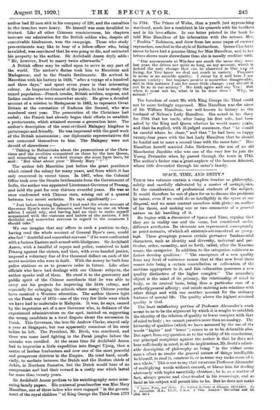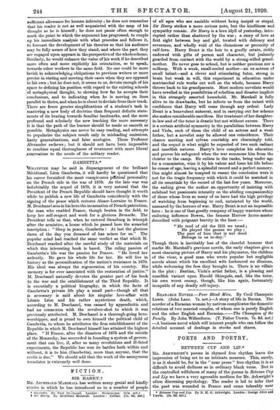SPACE, TIME, AND DEITY.* THESE two volumes contain a complete
treatise on philosophy, subtly and carefully elaborated by a master of metaphysics, for the consideration of professional students of the subject. It would therefore be out of place for us to discuss the problems he raises, even if we could do so intelligibly in the space at our disposal, and we must content ourselves with giving an outline of his thesis, and making one or two comments of a general nature on his handling of it.
He begins with a discussion of Space and Time, arguing that they are in reality one and the same, but considered under different attributes. Its elements are represented conceptually as point-instants, of which all existents are conceived as group- ings. These groupings possess certain pervasive fundamental characters, such as identity and diversity, universal and par- ticular, order, causality, and so forth, called, after the Kantian usage, the categories. In addition to the categories, existents as finites develop qualities : " The emergence of a new quality front any level of existence means that at that new level there comes into being a certain constellation or collocation of the motions appropriate to it, and this collocation possesses a new quality distinctive of the higher complex." The secondary object is the mind of its primary, the relationship of mind to body, or its neutral basis, being thus a particular case of a perfectly general affinity; and minds entering into relations with other things and with one another account for the ordinary features of mental life. The quality above the highest attained quality is God. The least satisfactory portion of Professor Alexander's work seems to us to be the argument by which it is sought to establish the identity of the relation of quality to lower complex with tha t of mind to body ; we cannot perceive more than an analogy. Tht hierarchy of qualities (which we have assumed by the use of the words " higher " and " lower ") seems to us to be debatable also. But apart from any question as to the validity of his conclusions, our principal complaint against the author is that he does not bear sufficiently in mind, in all its implications, Mr. Scott's admir- able description of philosophy as being " in the widest sense man's effort to render the general nature of things intelligible to himself, to read it, construe it, or in some way make sense of it as a whole." This is not to say that we accuse Professor Alexander of multiplying words without counsel, or blame him for dealing abstrusely with topics essentially abstruse ; he is, as a matter of fact, always precise and clear-headed in his reasonings, and as lucid as his subject will permit him to be. But he does not make • Space, Time, and Deity. The Gifford Lectures at Glasgow, 1916-1915. 1Cy S. Alexander. LL.D.. r.D.A. 2 Vole. London : Macmillan and Co. net.J
sufficient allowance for human infirmity ; he does not remember that his reader is not as well acquainted with the map of his thought as he is himself ; he does not pause often enough to mark the point to which the argument has progressed, to couple up his immediate analysis with what precedes and follows it, to forecast the development of his theories so that his audience may be fully aware of how they stand, and where the part they are engaged upon appears in the perspective of the whole scheme. Similarly, he would enhance the value of his work if he described more often and more explicitly his orientation, so to speak, towards other workers in the same field. No one could be more lavish in acknowledging obligations to previous writers or more precise in stating and meeting their cases when they are opposed to his own ; but he does not, it seems to us, devote enough of his space to defining his position with regard to the existing schools of metaphysical thought, to showing how far he accepts their conclusions, and to indicating when he is moving on lines parallel to theirs, and when he is about to deviate from their track. There are fewer greater simplifications of a student's task in mastering a new body of doctrine than frequent definite state- ments of its bearing towards familiar landmarks, and the more profound and scholarly the new teaching the more necessary it is that the path of the learner should be made as smooth as possible. Metaphysics can never be easy reading, and attempts to popularise the subject result only in misleading omissions, hasty generalisations, and false analogies. These Professor Alexander eschews ; but it should not have been impossible to combine equal thoroughness of treatment with more liberal .concessions to the needs of the solitary reader.



































 Previous page
Previous page